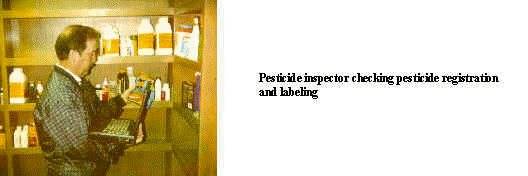CURRENT ONGOING
PROJECTS
Project 5
Project Title:
Electronic Communication
Agency:
Department of Agriculture and Consumer Services
Project
Implementation & Completion Dates:
Ongoing Effort
Project
Description: Five
divisions have made great strides in electronic communication with their
customers and employees. The
Agronomic Division provides soil tests, nematode assays, and plant/waste
solution analysis to farmers, businesses, and homeowners.
Much of the reporting and information storage is now in electronic
form. The division estimates
that more than 58,000 agronomic reports are generated annually. All reports are now posted on the Internet, and many clients,
including all county extension offices, have requested that the division
no longer send paper copies of soil test reports in the mail.
As a result, the division has reduced the total number of these
reports it sends through the mail by about 50 percent.
Unlike many state agencies, field employees of the NCDA & CS do not work from a regional office. Virtually all field employees work directly from their homes. This makes communications difficult because each employee must be notified individually by phone or mail. Five divisions have converted to electronic communication with their employees. The Agronomic Division was the first division to implement electronic communication with its field staff. The fourteen regional agronomists send and receive virtually all correspondence by e-mail. They also communicate with clients in the same manner. The Structural Pest Control Division currently has e-mail capability with its 17 field inspectors and supervisors. The inspectors now submit inspection report forms in electronic form as well as send and receive routine office correspondence. The Meat and Poultry Inspection Section has almost completed implementation of a program called Field Automation Information Management. By the end of 2000, the sectionís entire 110 person field staff will have the electronic capability to receive updates to inspection manuals, receive scheduling information, send inspection reports, and send/receive routine correspondence. The Plant Industry Division has converted to electronic communication with 50 field employees and two remote offices. In addition to the benefits of electronic communication, data collection by field staff is actively catalogued through numerous databases. Additional work is being done on the divisionís web site. This web site provides descriptions of sectional programs, organizational structure, on-line forms, and detailed regulatory/quarantine information. In the near future, programs will be developed to permit clients to check on the status of samples or permits that have been submitted through the division.

Contacts:
- Dr. Ray Tucker, Agronomist,
Agronomic Division
(919)733-2655
Ray.Tucker@ncmail.net - Carl Falco, Division Director,
Structural Pest Division
(919)733-6100
Carl.Falco@ncmail.net - David Marshall, Director,
Meat and Poultry Inspection
(919)733-4136
David.Marshall@ncmail.net - Bill Dickerson, Division Director,
Plant Industry Division
(919)733-3933
Bill.Dickerson@ncmail.net
Anticipated Environmental Sustainability Benefits: A tremendous amount of paper and the associated filing, handling, and mailing expense have already been eliminated in the five divisions. Items such as routine correspondence, inspection and test reports, and the updating of manuals and inspection protocols are done electronically. Office personnel and field supervisors spend less time trying to reach employees by telephone. Citizens can directly access the information they seek without having to go through someone on the telephone. This frees employees to handle other, more pressing business. Other divisions are working to achieve a similar level of electronic communication capability as budgets permit.
|
|
Agriculture Home Page |
Farmers Market
|
Center for Environmental Farming Systems | |